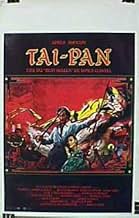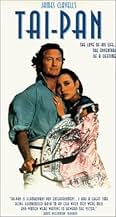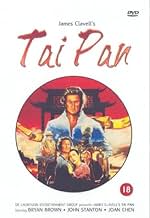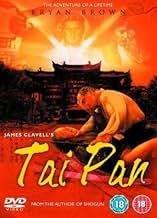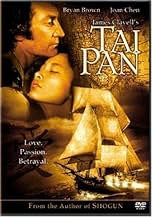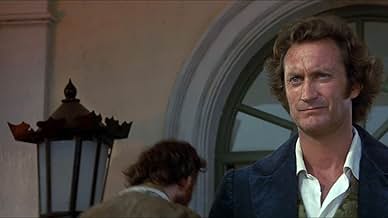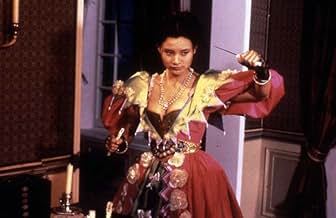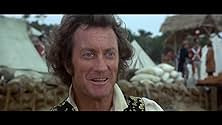IMDb-BEWERTUNG
5,6/10
2042
IHRE BEWERTUNG
Historische Fiktion vor dem Hintergrund von Hongkong in den ersten Jahren der britischen Herrschaft.Historische Fiktion vor dem Hintergrund von Hongkong in den ersten Jahren der britischen Herrschaft.Historische Fiktion vor dem Hintergrund von Hongkong in den ersten Jahren der britischen Herrschaft.
- Regie
- Drehbuch
- Hauptbesetzung
- Auszeichnungen
- 2 Nominierungen insgesamt
Empfohlene Bewertungen
I found this movie to follow the novel pretty closely, considering of course that the novel is about 900 pages and the movie is only two hours! While not of the same outstanding caliber of adaptation as the Shogun miniseries, it nevertheless manages to generate some excitement and give a flavor for the happenings of that period, during which the colony of Hong Kong was founded.
Joan Chen was especially good as Mai-Mai, and all the other parts were at least adequately cast. The locations, sets and production values were of uniformly good quality. The only thing lacking was enough time to tell a story this long and complex--in such a short production one only has time to hit the high points of the plot. But it was enjoyable nevertheless.
Joan Chen was especially good as Mai-Mai, and all the other parts were at least adequately cast. The locations, sets and production values were of uniformly good quality. The only thing lacking was enough time to tell a story this long and complex--in such a short production one only has time to hit the high points of the plot. But it was enjoyable nevertheless.
I agree with other comments that this should have been a miniseries but on HBO not commercial TV. The scenes with the various women would have been destroyed with censorship. I believe that it did give an accurate "feel" to the times and events depicted.
Upon viewing this I immediately ordered the book ( I had ignored it due to some disappointment at Nobel House ). Also bit the bullet and ordered Shogun the miniseries. Mr. Clavell's work s are to be appreciated even in movies that fall short. I do wish Bryan Brown had a better accent but Joan Chen mimicked it perfectly.
The supporting cast both western and oriental were excellent. Also the "few" ships used were great. Now I want Noble House on DVD.
Upon viewing this I immediately ordered the book ( I had ignored it due to some disappointment at Nobel House ). Also bit the bullet and ordered Shogun the miniseries. Mr. Clavell's work s are to be appreciated even in movies that fall short. I do wish Bryan Brown had a better accent but Joan Chen mimicked it perfectly.
The supporting cast both western and oriental were excellent. Also the "few" ships used were great. Now I want Noble House on DVD.
Tai-Pan was probably too ambitious an undertaking for a film as short as just over 2 hours. Maybe a mini-series would have been the answer, but Tai-Pan certainly had the potential to be an oriental Gone With The Wind.
Unrealized potential though it is. The screenplay made many references to previous events in the novel that are not shown here. We do know there's one nasty rivalry going on between Bryan Brown and John Stanton who both rose to wealth in the China trade like the protagonists in an Edna Ferber novel.
Bryan Brown is the Far East version of Rhett Butler. He's built the family fortune on legal trade and illegal trade in opium. Not that opium was unknown before the British and other European powers got there, but they did turn it into a thriving business. When the Chinese government objected, the European powers took nibbles out of a prostrate and weakened state.
One of those nibbles the British took was Hong Kong, spoils from the Opium War of 1841. Brown like Margaret Mitchell's Rhett Butler or the hero of many Edna Ferber books is the guy who builds what became one of the busiest trading centers on the globe.
Unlike his rival Stanton, Brown's wife left him and took their small son back to the United Kingdom. Brown didn't mourn he took up with some Chinese women, they were pawns in various business negotiations. He got a son, Russell Wong, from one of them.
Things get interesting when his other son arrives from Great Britain played by Tim Guinee. He's a rather uptight Victorian youth who is not pleased with the debauchery he finds and his father's part in it.
Tai-Pan is exquisitely photographed with the climatic typhoon scene very well done indeed. A better screenplay would have been needed to tell this epic story.
Unrealized potential though it is. The screenplay made many references to previous events in the novel that are not shown here. We do know there's one nasty rivalry going on between Bryan Brown and John Stanton who both rose to wealth in the China trade like the protagonists in an Edna Ferber novel.
Bryan Brown is the Far East version of Rhett Butler. He's built the family fortune on legal trade and illegal trade in opium. Not that opium was unknown before the British and other European powers got there, but they did turn it into a thriving business. When the Chinese government objected, the European powers took nibbles out of a prostrate and weakened state.
One of those nibbles the British took was Hong Kong, spoils from the Opium War of 1841. Brown like Margaret Mitchell's Rhett Butler or the hero of many Edna Ferber books is the guy who builds what became one of the busiest trading centers on the globe.
Unlike his rival Stanton, Brown's wife left him and took their small son back to the United Kingdom. Brown didn't mourn he took up with some Chinese women, they were pawns in various business negotiations. He got a son, Russell Wong, from one of them.
Things get interesting when his other son arrives from Great Britain played by Tim Guinee. He's a rather uptight Victorian youth who is not pleased with the debauchery he finds and his father's part in it.
Tai-Pan is exquisitely photographed with the climatic typhoon scene very well done indeed. A better screenplay would have been needed to tell this epic story.
As another reviewer put it, this movie was very similar to Dune. Very interesting comparison, since Raffaella De Laurentiis produced them both. This was her first project right after Dune. Both were sweeping epic sagas with multiple intertwined plotlines. Both should have been six or eight hour mini series and not feature films. As with Dune, you will find that if you have not read the book, you will not understand the movie. However, if you have read the book, then the movie isn't all that bad. James Clavell's 'Asian Saga' is one of my favorite book series, so I bought this movie cheap just to see it. The characters are like old friends to me, so I didn't think that the movie was all that bad. I realized while watching it though, that someone who had not read the book would not be able to keep up with all of the plot points. My suggestion to you is to read the book, then watch the movie. You will discover two things; first it's a super good book. Second, this movie had everything going for it in cast and settings; it just had too much story to tell in too short a time. It definitely should have been a six-hour miniseries.
As a movie reviewer for my college newspaper, I often was told: "You've got a great job, you get paid to go to movies." My standard answer was: "It's not that great - I had to sit through 'Tai-Pan'." The only movie that has given me more pain was "Ishtar."
Wusstest du schon
- WissenswertesProducer Martin Ransohoff and the Metro-Goldwyn-Mayer studio in 1966 acquired the rights to James Clavell's source "Tai-Pan" novel for US $500,000. The movie was then announced by MGM in 1967-68 to star Patrick McGoohan to play Dirk Struan, to be directed by Michael Anderson, with source novelist Clavell writing the screenplay. The picture was originally budgeted to cost US $26 million which was then reduced to US $20 million. The project sat around stagnant for a time in development hell. However, after severe operating losses, the epic was one of a number of expensive projects the new management at the MGM studio dropped as being too costly. The project and the development of the movie at MGM was in the end canceled by executive James T. Aubrey.
- PatzerIn a scene, set in 1841, several of the ladies were wearing bright mauve outfits. That would have been most unlikely for the wives of middle class traders at that time as the color purple was prohibitively expensive before the invention of analine dyes in London - in 1856. By 1870 these gaudy colors had become so cheap and commonplace that it became a status symbol to mimic the subtler, paler colors of the pre analine dye days.
- Zitate
Dirk Struan: No emperor has seen the guns of a British man-of-war.
Top-Auswahl
Melde dich zum Bewerten an und greife auf die Watchlist für personalisierte Empfehlungen zu.
- How long is Tai-Pan?Powered by Alexa
Details
Box Office
- Budget
- 25.000.000 $ (geschätzt)
- Bruttoertrag in den USA und Kanada
- 4.007.250 $
- Eröffnungswochenende in den USA und in Kanada
- 1.863.469 $
- 9. Nov. 1986
- Weltweiter Bruttoertrag
- 4.007.250 $
- Laufzeit2 Stunden 7 Minuten
- Sound-Mix
- Seitenverhältnis
- 2.35 : 1
Zu dieser Seite beitragen
Bearbeitung vorschlagen oder fehlenden Inhalt hinzufügen


